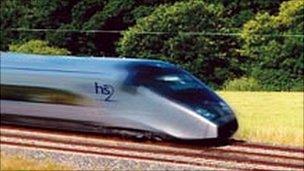High-speed rail: Stop HS2 group seeks judicial review
- Published

The trains will travel at speeds of up to 250mph between London and Birmingham
Campaigners against the £33bn high-speed rail project (HS2) are to seek a judicial review of the government's decision to approve the scheme.
The first phase of HS2, between London and Birmingham, is scheduled to be running by 2026 and be extended later to northern England.
The government said last month it would create jobs and growth.
But critics have disputed projected benefits of up to £47bn and say the route will also damage the environment.
Stop HS2 said it was seeking evidence that the decision was flawed.
The line will first connect London to Birmingham, passing through rural parts of Buckinghamshire, Oxfordshire, Northamptonshire, Warwickshire and Staffordshire.
It will then go on to Manchester and Leeds and include stops in the East Midlands and South Yorkshire.
Passengers will be able to commute from Birmingham to London in 45 minutes. The current journey time is one hour and 24 minutes.
Joe Rukin, from Stop HS2, said it had until April to lodge the challenge and estimated costs would be about £100,000.
The group represented more than 70 other smaller action groups based in areas stretching from north of Euston up to south Staffordshire, Mr Rukin said.
Various organisations, including councils, environmental groups and action groups, would be involved in challenging the decision, he added.
"There will definitely be a judicial review, it just depends who leads it," he said.
"The intention is to make the legal challenge as co-ordinated as possible.
"We have a few months to lodge it and we estimate the cost will be around £100,000.
'Great consideration'
"Of course, it [the review] will take as long as it takes and cost as much at it will cost."
He said they were also now speaking to other groups and councils further north and wanted any evidence from all groups and residents that they felt demonstrated the decision was flawed.
Lucy James, a spokesperson for the Campaign for High Speed Rail, described the potential judicial review as a "colossal waste of time and money".
She said: "If local councils along the route foot some of the bill, then in some instances this money could be coming directly from the taxpayer.
"The Department for Transport received and considered nearly 60,000 submissions during the course of their public consultation, and as a result they implemented changes to their original plans which are clearly visible in the alterations they made to the final route.
"Instead of a long drawn-out process through the courts, people from both sides should be working together to ensure that we build the best high-speed railway possible."
'Keep Britain moving'
Confirming the rail route would go ahead last month, Transport Secretary Justine Greening described the line as "the most significant transport infrastructure project since the building of the motorways".
A spokesman for the Department for Transport (DfT) said the new network would provide passengers with more seats and connections as well as jobs and prosperity "for the entire country".
"This is not a decision that we have taken lightly or without great consideration of the impact on those who are affected by the route from London to Birmingham," the DfT said in a statement.
It said the route struck "the right balance between the reasonable concerns of people living on or near the line, who will be offered a generous compensation package, and the need to keep Britain moving".
- Published11 January 2012
- Published10 January 2012
- Published10 January 2012
- Published10 January 2012
- Published10 January 2012